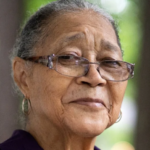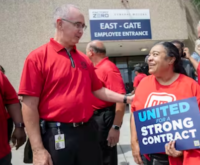By FELICIA FONSECA
Associated Press
FLAGSTAFF, Ariz. (AP) _ The president of the nation’s largest Indian reservation stood behind a tribal law that requires people seeking the top elected post to be fluent in the Navajo language, dealing what could be a final blow to a candidate who had been criticized for his speaking skills.
The issue of fluency has deeply divided Navajos on and off the vast reservation that, while known internationally for its picturesque rock formations, struggles with high rates of unemployment, poor housing and a lack of electricity and running water.
At stake is the bigger question of how tribal leaders maintain ties to the language. More than half of the Navajo Nation’s estimated 300,000 members speak the language, but knowledge of it fades among younger generations.
Navajo President Ben Shelly vetoed legislation Tuesday that would let voters decide whether presidential hopefuls are proficient in the Navajo language, prompting Chris Deschene to cease his campaign. In his veto message, Shelly said the requirements for president should be addressed through a reservation-wide vote, not by tribal lawmakers in the days leading up to the Nov. 4 general election.
Deschene’s candidacy was sidelined by the tribal courts after a weekslong battle over his inability to speak the language fluently. Deschene has said fluency is a matter of opinion and that he is proficient in the language. But he refused to demonstrate his skills, saying he was unfairly being singled out.
The Navajo Nation Council voted last week to change the language requirements, but Shelly vetoed the bill.
Shelly said the tribe needs to uphold its laws and do more to maintain its language through programs in schools and tribal government. The tribe also needs to provide more opportunities for interaction between elderly Navajos and the youth, he said.
“Every society has an obligation to hold on to their traditions,” Shelly wrote. “If we lose our language and culture, who are we?”
Deschene has not removed himself from the race entirely, campaign spokeswoman Stacy Pearson said. He will not pursue legal action to stay in the race, but he will be monitoring any decisions made by the Navajo Board of Election Supervisors, she said. The board has remained adamant about protecting voters’ rights and upholding a traditional tribal law that says Navajos have the right to choose their leaders.
“It is with tremendous pride in our campaign and disappointment with the president’s veto that the future of my candidacy is uncertain,” Deschene said in a statement.
The Navajo Supreme Court ordered election officials last week to postpone the Nov. 4 vote, move up the third-place finisher from the presidential primary and immediately reprint ballots without Deschene’s name. Election officials have yet to act on the order and face a request by attorneys for two former presidential hopefuls, Dale Tsosie and Hank Whitethorne, to hold them in contempt for not doing so. A hearing is scheduled Friday on the matter.
Dozens of Deschene’s supporters gathered at his campaign headquarters Tuesday in Window Rock, angry over the possibility their votes might not be counted. About 8,000 absentee and early ballots have been turned in to tribal election offices so far.
Shelly said he understands people are upset and urged them not to promote or participate in civil unrest, referencing a power struggle in 1989 that led to a deadly riot.
The council could override Shelly’s veto, but it would require 15 votes in a special session. Delegate Leonard Tsosie, a co-sponsor of the legislation to amend the requirements for the presidency, said he would encourage his colleagues to do so.
“I understand the concern about the language, but we can work together to revive that,” Tsosie said. “He ended up pushing the youth further away with his veto.”
Former President Joe Shirley Jr., who along with Deschene advanced to the general election, said he would not support any effort to change tribal law requiring presidential candidates to be fluent in the language said to have been handed down by deities.
“The language needs to continue to be there,” he said. “It’s a major thing. It should be a big thing with our nation just like any other nation.”










